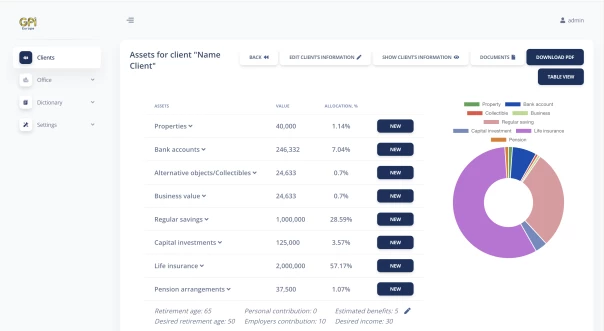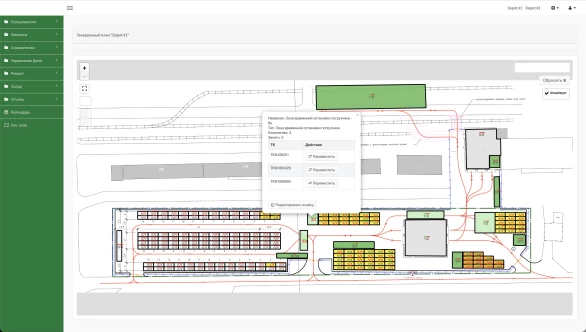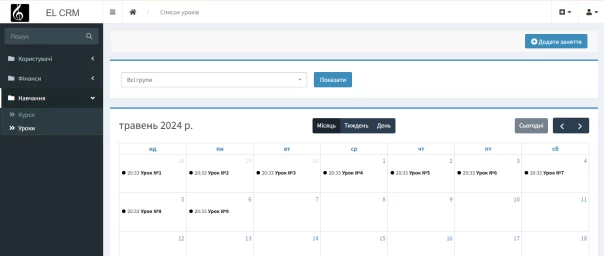Where do web projects live?
The article describes why a web project needs a server, what it is, and how to choose the right one.

CRM System Replatforming for Financial Consultants
More about the serviceCRM System Development
We provide a full range of services for the development and support of online stores, informational websites, CRM/ERP systems, and SEO optimization — from creating technical specifications and prototyping to configuration, launch, and ensuring the quality and stability of your product.

Development and Support of ERP for a Tank Washing and Repair Depot
More about the serviceERP System Development
We develop custom ERP systems — comprehensive solutions for automating and integrating key business processes (finance management, HR, production, supply chain, sales, and more). We provide a full cycle of services: needs analysis and technical specification development, architecture design, system development and integration with existing solutions, implementation with staff training, as well as technical support and regular updates.

Online stores for beauty professionals.
More about the serviceOnline Store Development
Online store development is a comprehensive process of creating an e‑commerce platform tailored to all client requirements — from preparing technical specifications, prototyping, and design to implementing the website and admin panel, testing, content integration, and ongoing support. This ensures a convenient UX for customers and seamless store operation.

Development of an SEO-optimized informational website for a well drilling company.
More about the serviceDevelopment of informational websites
The development of an informational website is essential for those who aim to showcase their activities online and attract new clients: a modern business card website allows for flexible content updates through an admin panel, displays news and links to social media, and is optimized for search engines, retaining existing audiences and increasing brand trust.

SEO website promotion — boosting visibility and attracting clients from search
We help businesses receive a stable flow of clients from Google. SEO promotion is not just about keywords, but a comprehensive set of work — from technical optimization and content to analytics and link-building.
We create business websites for companies of any size
We develop modern business websites that help present your company, attract new clients, and increase brand trust. These can be landing pages, corporate websites, or multi-page portals with additional functionality.

Content creation — texts, visuals, and videos for your business
We combine the power of artificial intelligence with the expertise of our copywriters, designers, and video editors. We create texts, visuals, and videos that help your brand look professional, communicate effectively, and attract customers.
We create convenient business card websites for companies of any scale
We develop business card websites that help quickly present services, increase recognition, and attract clients. Such websites are ideal for specialists, small companies, or brands that require a compact yet professional online presence.

Content management — professional content creation and support for your website
We take care of all tasks related to content creation, updates, and website structure. Content management is a set of services that includes adding texts, photos, products, news, SEO elements, and keeping your website up to date.

Server administration — stable performance, security, and productivity for your business
We provide full technical server administration to ensure your websites and services run reliably 24/7. Our team has been working for years with Hetzner — one of the most reliable European data centers. We know how to properly configure, optimize, and maintain the infrastructure for your project.
We create intelligent chatbots for Telegram, Viber, WhatsApp, and websites
We develop chatbots that automate customer communication, sales, and technical support. Bots help respond faster, collect requests, accept payments, and operate 24/7 without days off.

Screenshot of the warehouse management module
View Case
ERP system for managing a tank container cleaning and repair station, built on Symfony and deployed on Linux Ubuntu with MySQL for reliability and scalability. The solution includes an administrative panel and a client portal with 49 modules for managing clients, orders, finances, calendar, inventory, and reporting, with capabilities for automatic PDF invoice generation, notifications, and data export to accounting software for complete business process digitalization.

Homepage of the website, VIP announcements block
View Case
A platform for posting announcements in the agricultural sector, connecting farmers, suppliers, and buyers to streamline the buying and selling of agricultural goods and services with increased market transparency and reduced search costs. The system includes an admin panel for moderating announcements, managing content, and analytics, as well as a seller's personal account with the ability to publish and manage announcements and transaction history.

Homepage of the website, VIP announcements block
View Case
A CRM system for a financial consulting company, developed as a custom solution instead of a SaaS product to automate document management and enhance client interaction through admin and client interfaces, with capabilities to manage assets, users, calendars, and dictionaries, generate PDF reports, and synchronize events with Outlook. The project is built on Symfony with PHP 8.3, deployed on Ubuntu 22.04 with a MySQL 8.0 database to ensure system reliability, security, and scalability.

Main Menu of the Project
View Case
Informational website Aquamen for water well drilling services, built with a user‑friendly admin panel for managing users, content blocks, and a feedback module. It supports SEO features (automatic sitemap, no‑index/no‑follow) and sends notifications about new requests via a Telegram bot.

Home Page, Main Menu
View Case
Online store for beauty professionals, developed on Symfony 6.4 and PHP 8.3, deployed on an Ubuntu 22.04 server with a MySQL 8.0 database. It features an intuitive client interface with a product catalog, shopping cart, and order checkout, along with a powerful admin panel for managing products, categories, brands, users, orders, and SEO optimization. The system supports data export and automatic generation of PDF invoices and reports.

Website Home Page, Users, Finance, Learning
View Case
CRM system for a foreign language school designed to efficiently manage student relationships: it enables storing and structuring personal data, course history, and communication records, while automating registration, payment, and class scheduling processes through three key modules — Users, Finance, and Learning.

Website Home Page, Users, Finance, Learning
View Case
A custom CRM system for a service business in the truck detailing industry. The solution enables centralized management of clients, services, orders, payments, and staff, automates payroll calculations, and provides detailed business analytics.

Website Home Page, Users, Finance, Learning
View Case
A Telegram bot with an administrative panel was developed for the client, allowing for the automation of order intake, product catalog management, and request processing without operator involvement. The solution is designed for fast customer service and easy management for the business.

Website Home Page, Users, Finance, Learning
View Case
A fast start for your service business: an intuitive client-facing website, easy booking management, and simple service control via the admin panel.

Website Home Page, Users, Finance, Learning
View Case
An interactive web calculator for furniture businesses that allows customers to configure products independently, receive an accurate cost calculation, and generate a detailed PDF report with drawings.

Website Home Page, Users, Finance, Learning
View Case
A ready-made solution for launching an expert business focused on selling services and products. The website structure is adapted for scalable growth, easy content management, and fast project launch.

An online store for business has become a real godsend in the world of entrepreneurship. Its creation has revolutionized the business world, as now it is not necessary to organize a physical point of distribution to sell. Some people see online stores as a supplement, but they are a completely self-sufficient tool with their own advantages and features.
The online sales industry has undergone a significant transformation since its inception. Today, we can find offers to purchase goods or services not only on specialized websites.
Let's take a look at the typical formats of online sales.
An online store is a specialized website that, in addition to a catalog of goods, provides tools for accepting and processing orders and making payments. Such resources are a tool for online commerce literally, because they directly carry out the sales process. The website is located on its own domain and is controlled by the owner.
Online stores offer goods and services from a single seller. Everything that happens on the website depends on the owner: new deliveries, discounts and promotions, catalog volume, and production. Disputes with customers are resolved directly by the administration of the online store - there are no third parties involved.
The development of an online store allows you to sell without geographical restrictions, offers are available to all customers within its logistics capabilities.
Instagram is very popular among users. It can also be used for business. An Instagram page can act as an independent trading platform or be an addition to the main online (or physical) store.
Popular trading niches are:
health and cosmetics
food
everyday goods, children's goods;
clothing, accessories.
The Instagram sales model as a standalone sales outlet is more suitable for small businesses and has great limitations in attracting customers - only Meta ads. There are almost no alternative ways to get traffic, unlike a website where you can use advertising, as well as website promotion on Google and other channels. Frequently, large companies use the platform to prepare customers to come to the main store.
A marketplace is a ready-made trading platform with many sellers. The principle is simple: the provider offers a sales platform with a ready-made customer base contained in the CRM, and sellers rent virtual stores. A typical example of a marketplace is Amazon.
Top marketplaces have a huge audience of customers ready to make offers. Integration of a CRM system will further increase the seller's potential, especially at the stage of its expansion.
This type of website does not engage in direct sales. It is a platform where buyers can act as sellers at the same time. Online marketplaces are only platforms for finding a suitable client (buyer or seller). The rating of a website directly affects its traffic - the higher it is, the more chances you have to find the right offer.
Typical examples of platforms with ads: Ebay or Facebook marketplace.
Criteria. | Online store | Instagram store | Online e-commerce marketplace | Marketplace |
|---|---|---|---|---|
Service area | Within one country or internationally | Locally | International trade is possible | |
Language localization | Multilingual | Monolingual | Mostly monolingual | Mostly monolingual |
Adaptation to small businesses | Adapted | Adapted | No | No |
Support for large businesses | Yes | No | No | Yes |
Suitable for any industry | Absolutely | No | Suitable | Suitable |
Audience engagement | Middle | Middle | High | High |
Uniqueness of offers | Full | No | No | No |
Start-up costs | High | Low | Middle | High |
In this aspect, the advantages of an online store are obvious. The only point is that Instagram trading is more suitable for small businesses without large investments. If the seller has limited offers, and there are no plans to expand production at this stage, it is more profitable to use this trading format. As the business grows, priority should be given to the first option in the comparison of an online store vs an Instagram store.
A marketplace is a promoted brand with a large number of potential sellers. By launching trading within such a platform, the seller automatically subscribes thousands of customers to their product. There is no need to attract them further, they are already registered on the marketplace. All that remains is to make them interested in the offer.
Marketplaces do not limit sellers in the assortment. One outlet can have several brands, and the catalog can be expanded during seasonal offers.
In the comparison of online stores vs. marketplaces, the second option wins, but there is a point. An online store is more reasonable when:
There are no competitors within the online store, it is the property of a specific business.
An online e-commerce marketplace is a simple way to try your hand at online trading. You need minimal investment, just your own profile on a website with services. In a few minutes, the user posts an ad, photos of the product (or service), and waits for a response. The message board already has an audience that is interested in buying something.
The need for an online store for business arises when it comes to systematic trading. As a rule, you cannot place the entire catalog of your offers on a bulletin board. There are no options for convenient online trading, price management, etc. - the entire range of tools is limited to the offers of the platform itself.
An online store is your space where you set the rules.
Why do you need an online store - a few important points:
the owner needs to promote his/her brand;
you need access to an unlimited audience;
the resource is almost fully automated in combination with CRM;
there are no restrictions on marketing, promotion, and competition.
In today's realities, top manufacturers have no question whether their business needs an online store. The effectiveness of this tool has been proven, and our website development company, including online stores, will help you with the technical implementation of your business in sales.

The article describes why a web project needs a server, what it is, and how to choose the right one.

We are used to the fact that CRMs are designed for trade and e-commerce. However, this software has proven itself in completely unexpected areas, such as educational one. Today we will talk about the benefits of CRM in educational institutions.

In this article, you will be able to read a brief overview of the development of a store based on online platforms and CMS. The information in the article will help you choose the right way for you.
Fill out the form to receive a free consultation
